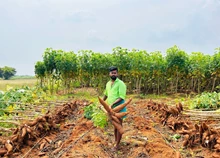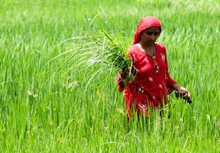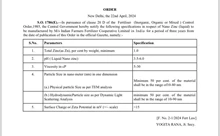
National Innovations on Climate Resilient Agriculture (NICRA) has identified 310 districts across 28 states and Union territories (UTs) in India as highly vulnerable to the impacts of climate change on agriculture. This information was disclosed by the Union Minister of Agriculture and Farmers' Welfare, Narendra Singh Tomar, during a written reply in the Lok Sabha on December 5.
Uttar Pradesh emerges as the most affected state, with 22 districts categorized as "very high" vulnerability and 26 districts as ‘highly’ vulnerable. The NICRA, initiated by the Indian Council of Agricultural Research (ICAR) in 2011, aims to bolster the resilience of agriculture to climate change and associated vulnerabilities.
Since its inception, ICAR has been instrumental in developing 1971 climate-resilient crop varieties, including 429 tolerant to abiotic stress and 1542 to biotic stress, contributing significantly to agricultural sustainability in the face of changing climatic conditions.
The vulnerability assessment classifies 109 districts in 23 states/union territories as "very high" vulnerability and 201 districts in 28 states/Union territories as "highly" vulnerable. Apart from Uttar Pradesh, other states with a considerable number of "very high" vulnerability districts include Rajasthan (17), Bihar (10), and Kerala (8).
In the ‘highly’ vulnerable category, Uttar Pradesh continues to lead with 26 districts, followed by Madhya Pradesh (14) and Orissa (13). West Bengal, Karnataka, Bihar, and Rajasthan each have 10 or more highly vulnerable districts. Other states, including Jharkhand, Manipur, Chhattisgarh, Telangana, and Tamil Nadu, also have districts classified as "highly" vulnerable to climate change.
To address the challenges posed by climate change and enhance agricultural resilience, the Ministry of Agriculture & Farmers Welfare has implemented several adaptation practices. These include community tank/pond renovation, water-use efficiency improvement, laser land leveling, soil test-based integrated nutrient management, community paddy nurseries, contingency crop plans, sustainable intensification in rice fallows, and zero-till sowing.
Additionally, the promotion of small farm mechanization through custom hiring centers is considered a key practice to boost food production in the country. These measures aim to safeguard food security by mitigating the adverse effects of climate-related issues on agricultural productivity.











